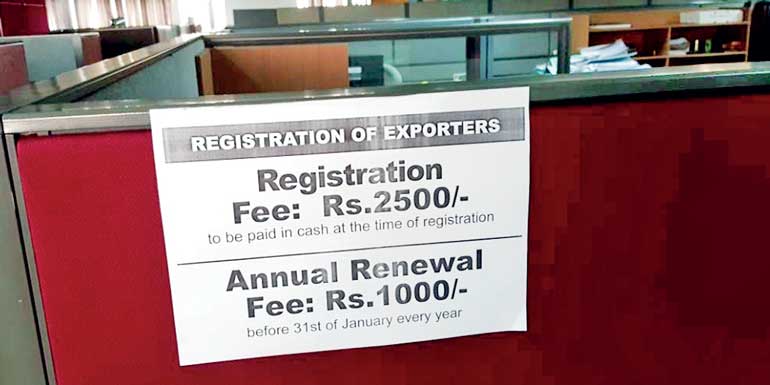Sunday Feb 22, 2026
Sunday Feb 22, 2026
Thursday, 30 November 2017 00:00 - - {{hitsCtrl.values.hits}}

With the introduction of a‘new EDB Registration Scheme’ by the Sri Lanka Export Development Board (EDB) with effect from 1 August,a plethora of paperwork and procedures burdening both existing and potential exporters have come into operation.
Furthermore the EDB would collect Rs. 2,500 from potential exporters at the time ofregistrationas anexporter and Rs. 1,000 from all exporters as an annual renewalfee. Details of the scheme arein Box 2,and inthe official website of the EDBhttp://www.srilankabusiness.com/edb/registration.html.
This new EDB registration system wouldhave enormous damaging repercussions on the Sri Lankan economy, as it could drive away both local and foreign investors intending to enter export business in Sri Lanka. 
It is ironical that this scheme is operated under the ‘Trade Facilitation Division’ of the EDB. It is verysurprising that the EDB has approved such an irresponsible move,whenthe countryneeds to expand its export base while attracting both local and foreign investments, and when the Government desperately wants to enhance the country’simage in the World Bank ranking in the ‘Ease of Doing Business’index.
Introduction of this new schemeappears as if the EDB has derailed from its original objective of developing exports and taken up anew function of controlling exports and revenue collection. The writer prefers to reason it as a mistake by all concerned.However this is an extremely disturbing situation that needs to be rectified urgently.
Should the EDB registerexporters?
Aunique identificationnumber to identify each exporter in thecountry is a prerequisite, for automation of its export procedure through electronic data processing. In the absence of such a specific number, the EDB, on a recommendation of the advisory committee on Trade Facilitation – SRILPRO, of which the writer was Secretary (1980-1999), took steps to introduce an exporter registration scheme by the EDB. Consequently the then Minister of Trade and Shipping issued a gazette notification dated 27June 1985 No. 355/14, making it mandatory for all exporters to register with the EDB.
A simple formto be filled by exporters was introduced.The only supporting document required to be submitted by exporters was the Business Registration Certificate (BRC) and the National Identity Card (NIC) in the case of an individual. No further questions were asked.
On the receipt of the application a number generated through an automated system was allocated to the applicant and intimated in writing to the exporter immediately, a procedure that took no more than ten minutes, and no charge was levied.The EDB then passed on the registration number to the Exchange Control Department and the Customs Department to be usedin their EDP applications.
However with the introduction the ASYCUDA System by the Customs Department in 1992,the Customs Department adapted the Tax Identification (TIN/VAT) numbers issued by the Inland Revenue Department to identify both importers and exporters making the EDB registration scheme redundant.
Today, if the EDB requires information on exporters for business development purposes it could obtain up-to-date information from the Customs Department, perhaps even online. Rs. 25 m has been allocated in the National Budget 2018for this purpose.
According to item 100 in the Budget speech, “The EDB, supported by institutions such as Sri Lanka Customs, Department of Commerce etc., will establish a trade portal (E trade Information Platform) that will allow the exporters to access reliable trade information on time and trade promotional tools including trade statistics, regulatory requirements, export/import procedures, etc.”Also it has been the policy of successive governments to establish a ‘Single Window’ to facilitate export businesses. Therefore there is no justification for introducing such a draconian registration scheme by the EDB.
The new exporter registration scheme is a consequence of continuing with a redundant scheme that the staff of the EDB seldom made use of.When queried about several unnecessary procedures, the response was that all systems would be automated very soon, assuming it is a panacea for all evils.
With this example, the time is opportune to review all activities of public institutions involved in the country’s export and import procedures and eliminate redundant requirements and then simplify necessary procedures before application of ICT, as automation on redundant procedures can have damaging consequences.
A recommendation for the EDB
It is proposed that the Minister in chargetakesaction to scrap the EDB Scheme for Registration of Exporters with immediate effect, and not let the country’s economy suffer.
The staff of the Trade Facilitation Unit at the EDB may be required to engage in more productive activities such as keeping abreast of recommendations of international and inter-governmentalagencies dealing with trade facilitation, identify measures that we need to adaptandfeed the National Trade Facilitation Committee (NTFC) of such measures.
They should also follow-up on implementation of their recommendations, and also ensure that institutions involved would not introduce counter-productive procedures. By doing so the EDB can support and supplement the tasks undertaken by the NTFC, as the main focus of the NTFC is on the implementation of the WTO Agreement. By doing so the EDB could play a pivotal role in trade facilitation in Sri Lanka, as done during 1980-1999.
The writer is an Advisor in Trade Facilitation who works closely with UN-ECE/CEFACT and UN-ESCAP/UNNExT. He was instrumental in introducing International Trade Facilitation Standards to Sri Lanka, since 1978. The writer can be contacted at
[email protected].)
Duly filled application form should be submitted along with the following supporting documents listed below, under each category with originals and photocopies.
mA Photo Copy of the National Identity Card of the Proprietor
mA photocopy of the National Identity Card of a partner who had signed the application
mCertificate of Incorporation
mRegistration of a Company – Form 01/Form 40 (Certified by the Dept. of Registrar of Companies).
mApplication should be signed by the Managing Director or any Director of the Company along with the company rubber seal on the Column No. 12.
mA Photo Copy of the National Identity Card of the Managing Director/Director who had signed the application
mA request letter addressed to Director / Trade Facilitation & Trade Information of the EDB by Managing Director / Director of the Company confirming exports.
The exporters should submit Certifications / Licenses of relevant Organizations to consider eligibility to the EDB Registration for items under license i.e. Tea, Gems & Jewellery, Mineral Sands, Wooden products, Fisheries products and Chemicals etc. e.g. Department of Import and Export Control: http://www.imexport.gov.lk/
A temporary registration certificate may be issued for only three months to enterprises who express their willingness to export if the basic documents available. However to obtain the status of the registration as an “Exporter”, it is required to produce documentary evidence in respect of exports such as CUSDEC Form, Bill of Lading/Airway Bill & Commercial Invoice, VAT & TIN certificates etc. within a period of one year.
Fees Payable